Abstract
Objective
This exploratory study serves to illustrate the psychological impact on an extended family in the process of genetic counselling and testing for a potentially life-threatening arrhythmia, the long-QT syndrome (LQTS).
Method
All members of the third generation and their partners (n=11) were interviewed, the mutation carriers with partners twice. In addition they completed measures for anxiety and depression three times in 18 months.
Results
During the interviews these family members emphasised the damaged solidarity when the family is divided into carriers and noncarriers of a mutation in a LQTS predisposing gene. This demonstrates one way in which a family can react to the reality of being at risk of a potentially severe disease. Rewriting family history and mourning early death seem other ways to deal with this. The distress scores, especially of the women, were moderate to clinically high, not because of their own chance of having an arrhythmia but more due to their children's risk.
Conclusion
Mothers need educational even more than emotional support, because the lifestyle of their carrier children is in need of radical change. The setting of a combined outpatient cardiogenetic clinic with a medical and psychosocial staff meets such needs efficiently.
Keywords: long-QT syndrome, genetic testing, genetic counselling, psychological impact
Full text
PDF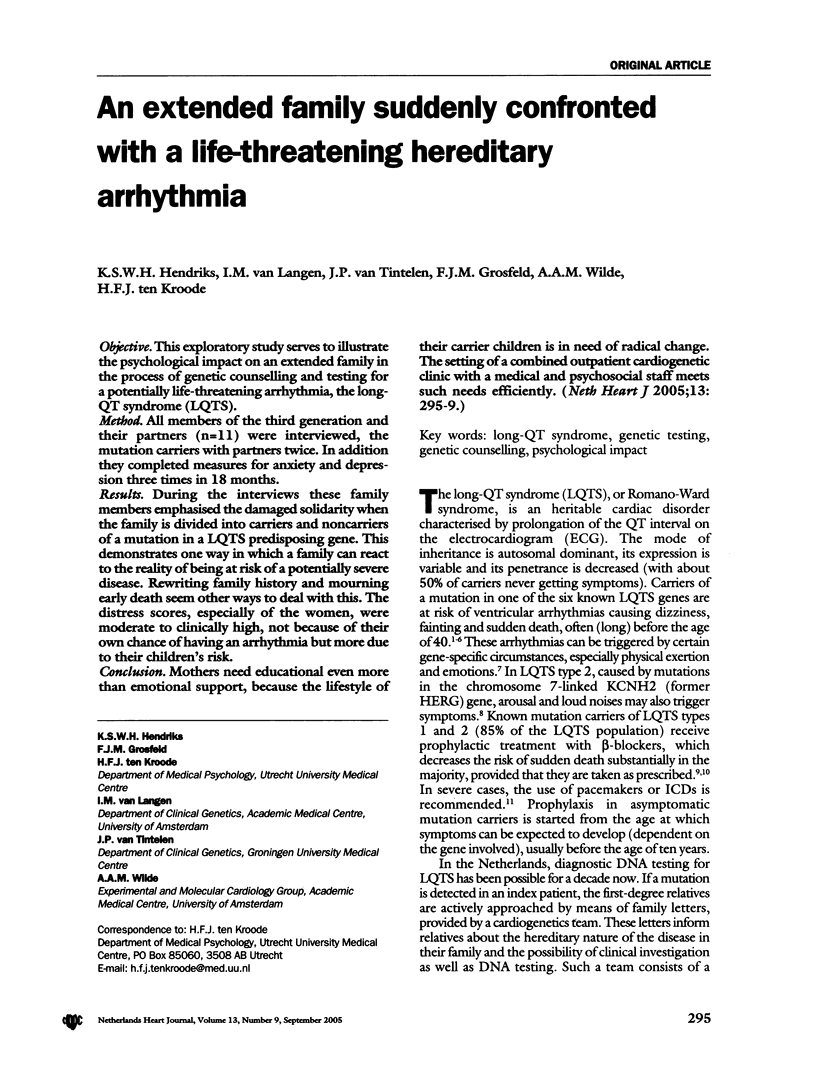
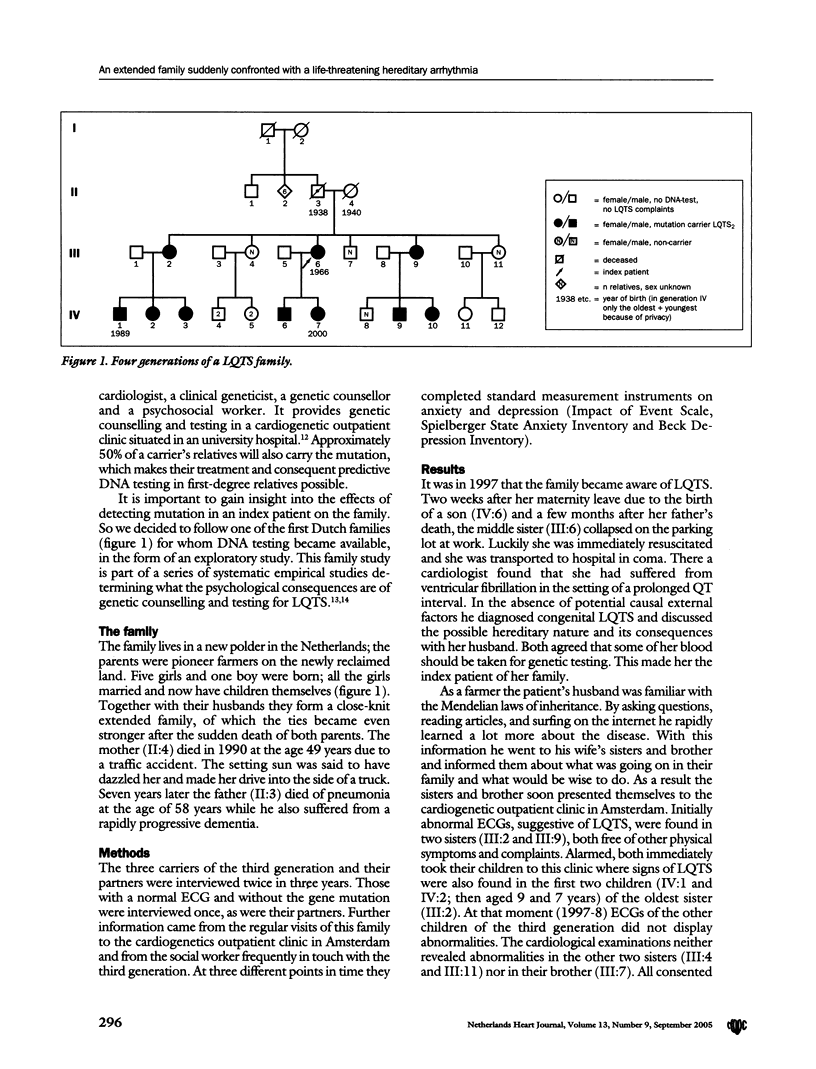
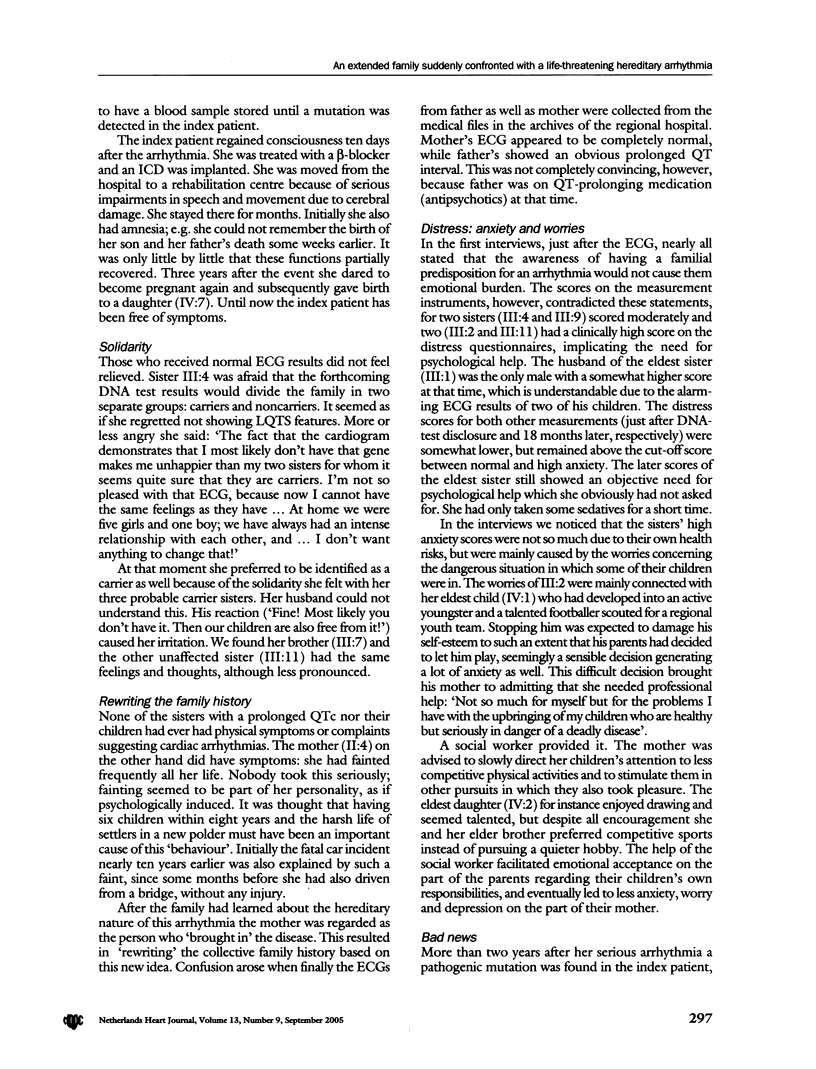
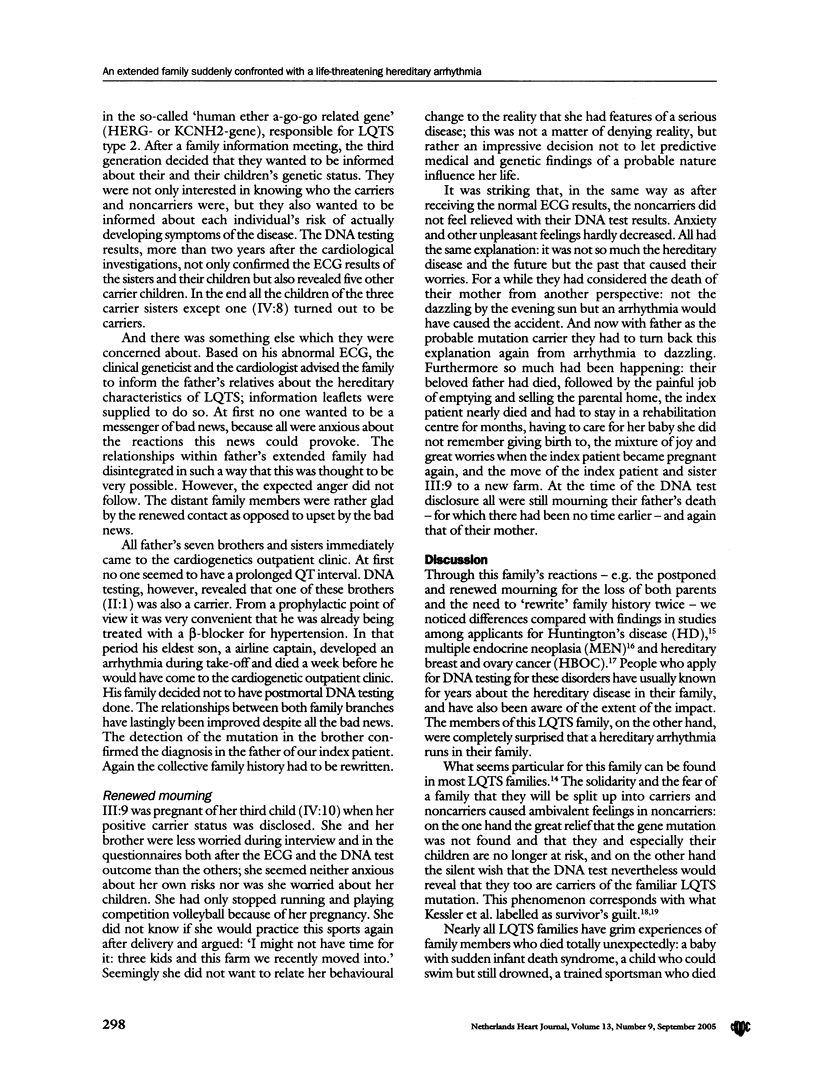
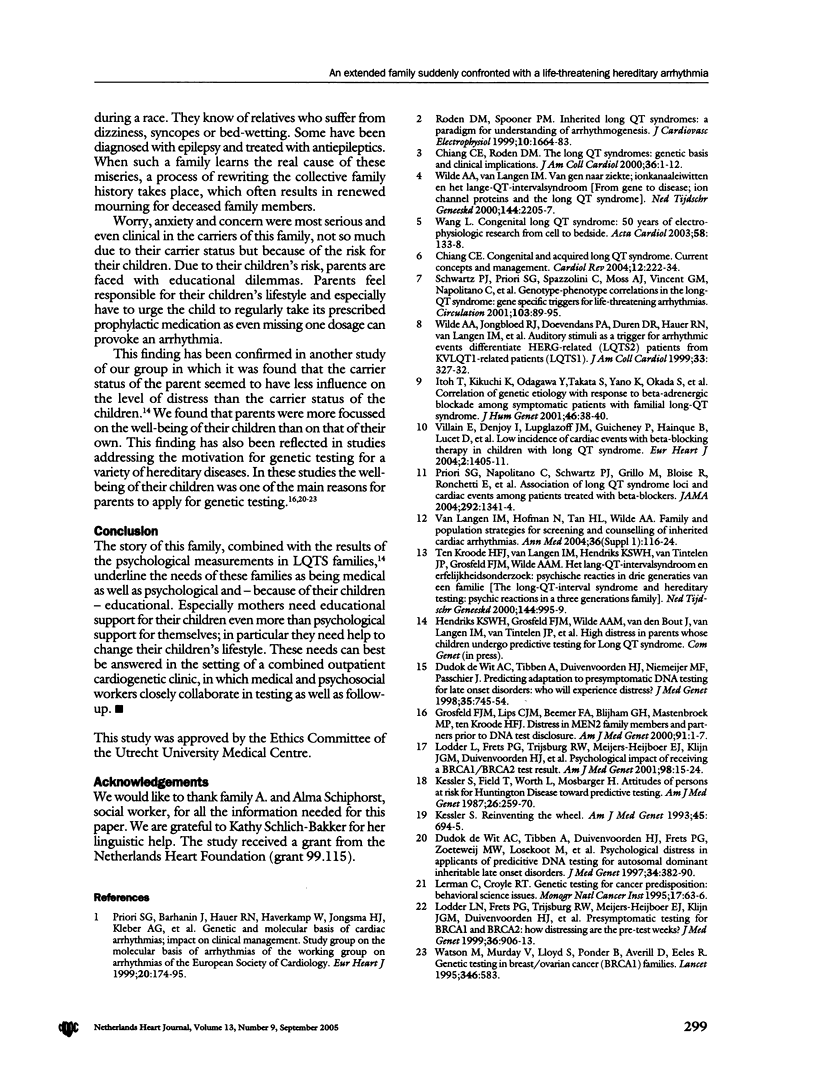
Selected References
These references are in PubMed. This may not be the complete list of references from this article.
- Chiang C. E., Roden D. M. The long QT syndromes: genetic basis and clinical implications. J Am Coll Cardiol. 2000 Jul;36(1):1–12. doi: 10.1016/s0735-1097(00)00716-6. [DOI] [PubMed] [Google Scholar]
- Chiang Chern-En. Congenital and acquired long QT syndrome. Current concepts and management. Cardiol Rev. 2004 Jul-Aug;12(4):222–234. doi: 10.1097/01.crd.0000123842.42287.cf. [DOI] [PubMed] [Google Scholar]
- DudokdeWit A. C., Tibben A., Duivenvoorden H. J., Frets P. G., Zoeteweij M. W., Losekoot M., van Haeringen A., Niermeijer M. F., Passchier J. Psychological distress in applicants for predictive DNA testing for autosomal dominant, heritable, late onset disorders. The Rotterdam/Leiden Genetics Workgroup. J Med Genet. 1997 May;34(5):382–390. doi: 10.1136/jmg.34.5.382. [DOI] [PMC free article] [PubMed] [Google Scholar]
- DudokdeWit A. C., Tibben A., Duivenvoorden H. J., Niermeijer M. F., Passchier J. Predicting adaptation to presymptomatic DNA testing for late onset disorders: who will experience distress? Rotterdam Leiden Genetics Workgroup. J Med Genet. 1998 Sep;35(9):745–754. doi: 10.1136/jmg.35.9.745. [DOI] [PMC free article] [PubMed] [Google Scholar]
- Itoh T., Kikuchi K., Odagawa Y., Takata S., Yano K., Okada S., Haneda N., Ogawa S., Nakano O., Kawahara Y. Correlation of genetic etiology with response to beta-adrenergic blockade among symptomatic patients with familial long-QT syndrome. J Hum Genet. 2001;46(1):38–40. doi: 10.1007/s100380170123. [DOI] [PubMed] [Google Scholar]
- Kessler S. Reinventing the wheel. Am J Med Genet. 1993 Mar 15;45(6):694–697. doi: 10.1002/ajmg.1320450607. [DOI] [PubMed] [Google Scholar]
- Lerman C., Croyle R. T. Genetic testing for cancer predisposition: behavioral science issues. J Natl Cancer Inst Monogr. 1995;(17):63–66. [PubMed] [Google Scholar]
- Lodder L. N., Frets P. G., Trijsburg R. W., Meijers-Heijboer E. J., Klijn J. G., Duivenvoorden H. J., Tibben A., Wagner A., van der Meer C. A., Devilee P. Presymptomatic testing for BRCA1 and BRCA2: how distressing are the pre-test weeks? Rotterdam/Leiden Genetics Working Group. J Med Genet. 1999 Dec;36(12):906–913. [PMC free article] [PubMed] [Google Scholar]
- Priori S. G., Barhanin J., Hauer R. N., Haverkamp W., Jongsma H. J., Kleber A. G., McKenna W. J., Roden D. M., Rudy Y., Schwartz K. Genetic and molecular basis of cardiac arrhythmias; impact on clinical management. Study group on molecular basis of arrhythmias of the working group on arrhythmias of the european society of cardiology. Eur Heart J. 1999 Feb;20(3):174–195. doi: 10.1053/euhj.1998.1220. [DOI] [PubMed] [Google Scholar]
- Priori Silvia G., Napolitano Carlo, Schwartz Peter J., Grillo Massimiliano, Bloise Raffaella, Ronchetti Elena, Moncalvo Cinzia, Tulipani Chiara, Veia Alessia, Bottelli Georgia. Association of long QT syndrome loci and cardiac events among patients treated with beta-blockers. JAMA. 2004 Sep 15;292(11):1341–1344. doi: 10.1001/jama.292.11.1341. [DOI] [PubMed] [Google Scholar]
- Roden D. M., Spooner P. M. Inherited long QT syndromes: a paradigm for understanding arrhythmogenesis. J Cardiovasc Electrophysiol. 1999 Dec;10(12):1664–1683. doi: 10.1111/j.1540-8167.1999.tb00231.x. [DOI] [PubMed] [Google Scholar]
- Schwartz P. J., Priori S. G., Spazzolini C., Moss A. J., Vincent G. M., Napolitano C., Denjoy I., Guicheney P., Breithardt G., Keating M. T. Genotype-phenotype correlation in the long-QT syndrome: gene-specific triggers for life-threatening arrhythmias. Circulation. 2001 Jan 2;103(1):89–95. doi: 10.1161/01.cir.103.1.89. [DOI] [PubMed] [Google Scholar]
- Villain E., Denjoy I., Lupoglazoff J. M., Guicheney P., Hainque B., Lucet V., Bonnet D. Low incidence of cardiac events with beta-blocking therapy in children with long QT syndrome. Eur Heart J. 2004 Aug;25(16):1405–1411. doi: 10.1016/j.ehj.2004.06.016. [DOI] [PubMed] [Google Scholar]
- Watson M., Murday V., Lloyd S., Ponder B., Averill D., Eeles R. Genetic testing in breast/ovarian cancer (BRCA1) families. Lancet. 1995 Aug 26;346(8974):583–583. doi: 10.1016/s0140-6736(95)91424-2. [DOI] [PubMed] [Google Scholar]
- Wilde A. A., Jongbloed R. J., Doevendans P. A., Düren D. R., Hauer R. N., van Langen I. M., van Tintelen J. P., Smeets H. J., Meyer H., Geelen J. L. Auditory stimuli as a trigger for arrhythmic events differentiate HERG-related (LQTS2) patients from KVLQT1-related patients (LQTS1). J Am Coll Cardiol. 1999 Feb;33(2):327–332. doi: 10.1016/s0735-1097(98)00578-6. [DOI] [PubMed] [Google Scholar]
- Wilde A. A., van Langen I. M. Van gen naar ziekte; ionkanaaleiwitten en het lange-QT-intervalsyndroom. Ned Tijdschr Geneeskd. 2000 Nov 11;144(46):2205–2207. [PubMed] [Google Scholar]
- ten Kroode H. F., van Langen I. M., Hendriks K. S., van Tintelen J. P., Grosfeld F. J., Wilde A. A. Het lang-QT-intervalsyndroom en erfelijkheidsonderzoek: psychische reacties in drie generaties van een familie. Ned Tijdschr Geneeskd. 2000 May 20;144(21):995–999. [PubMed] [Google Scholar]
- van Langen I. M., Hofman N., Tan H. L., Wilde A. A. M. Family and population strategies for screening and counselling of inherited cardiac arrhythmias. Ann Med. 2004;36 (Suppl 1):116–124. doi: 10.1080/17431380410032526. [DOI] [PubMed] [Google Scholar]


